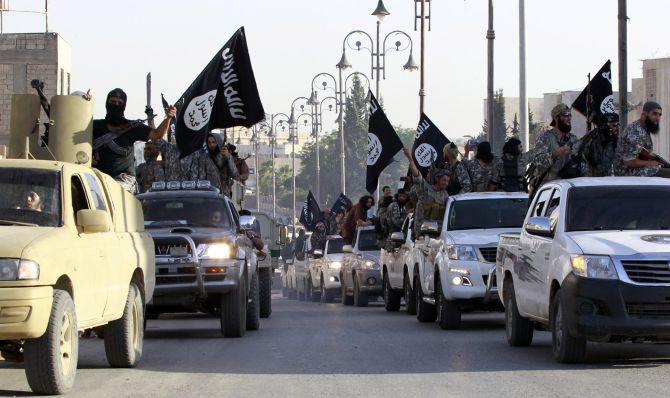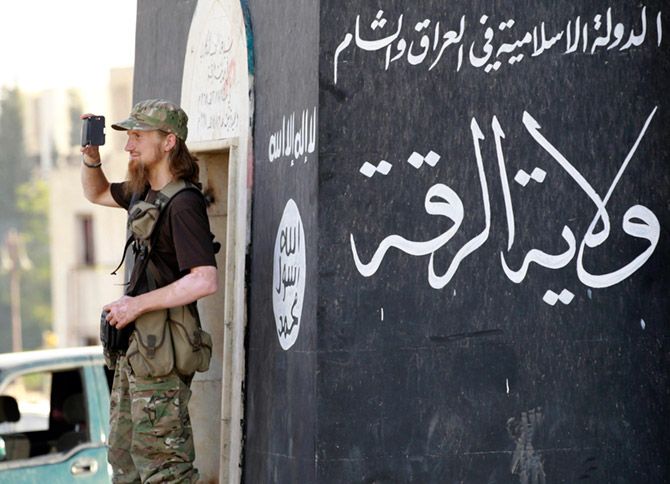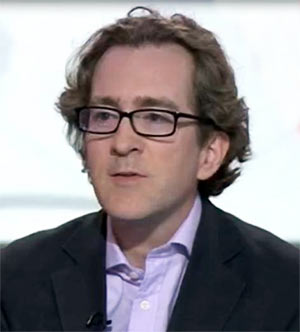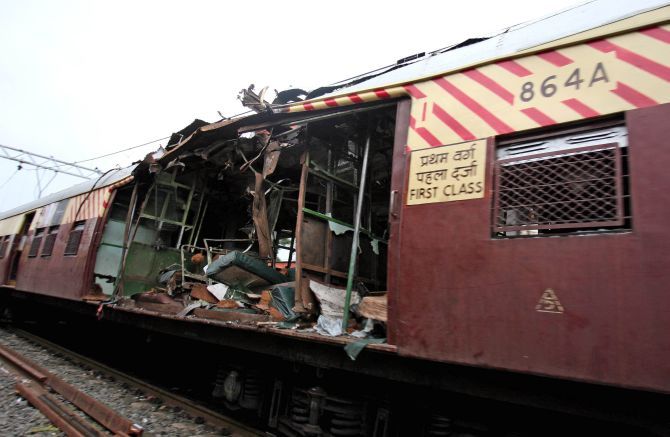'It has taken bombings in Beirut, bombing of a Russian airliner and now terror attacks in Paris for people to realise that we are not going to achieve our objectives of destroying ISIS if we drive in second gear. We need to get into top gear.'

"Western powers have sought to contain ISIS (Daesh), to put a ring around it and hope that it slowly goes away. Unfortunately, what has happened in the last 12 to 18 months," says Tom Keatinge, Director, Centre for Financial Crime & Security Studies at The Royal United Services Institute, London, "is that ISIS has established itself, proliferated into countries like Libya and Egypt; gathered support from other jihadi groups around the world like Boko Haram in Nigeria and so by delaying the more extensive use of military force, what we have done is allowed the group to take root among online communities, in Western capital cities and elsewhere in the world."
Keatinge, left, below, tells Prasanna D Zore/Rediff.com how Daesh funds its terrorism and what the world needs to annihilate these terrorists.
What explains Daesh (ISIS)'s financial muscle and how crippled would ISIS be if these sources of funding were to wither under concerted onslaught on their sources of funding?
The financial muscle of ISIS (Daesh) comes from the fact that it controls so much territory in Syria and Iraq.
Within that territory there are two important sources, one of which is, oil and oil refineries from which they earn money and the second is the population in these territories where they can tax the individuals and businesses.
The vast majority of their funding comes from sources that are within their control like any other State. Though they cannot be called truly a State, the fact is they control vast territories and offer their services to the people in these territories.
Are there any estimates as to how much Daesh earns annually from these sources of revenue?
It is an art rather than science. The US government estimates ISIS (Daesh) earned $3 million a day from oil 12 months ago. That is now reduced to $1 million a day... that is the latest estimate from the US.
I think between oil and tax you are looking at similar amounts. So, that is $300 million to $400 million from oil per year and a similar amount in terms of taxes collected.
Another statistic worth bearing in mind perhaps is the recent budget that the Iraqi government prepared for the areas of Iraq now controlled by Islamic State (Daesh) which was about $2 billion from services and salaries in that region. So, roughly I think the revenues could be in the range of $1 billion to $2 billion that they may be earning per year.
While one can understand that the West cannot stop Daesh from extracting oil and taxing people in the territories they control, why can't they stop the buyers of this oil from purchasing it from Daesh?
In the last 12 months the international community has really watched as ISIS (Daesh) has earned money from oil. It hasn't been particularly aggressive in trying to stop the oil production.
In the last week or so, there have been some changes in tactics like bombing of (Daesh) oil facilities, bombing of oil tanker convoys, etc. Generally, they are trying to disrupt not the demand side (stopping the buyers of oil), but supply side (destroying oil fields and tanker convoys).
The demand side is also, generally, outside the reach of the international community; the local people need cooking oil and diesel for their cars; the Assad regime also reportedly buys oil from ISIS (Daesh).
I think now the US and others have decided to go after the supply side rather than the demand side.
Apart from the locals, who else is buying oil that Daesh extracts?
This oil is sold through smuggling routes in Turkey that are decades old. In the border areas of Turkey it is cheaper to buy fuel from Syrian smugglers that it is to buy from the Turkish government or the national oil companies.
So, the smuggling routes have existed for decades, but it is only now that ISIS (Daesh) is benefiting from this smuggling that the international community is taking a much closer interest in plugging these routes.
Are there any concrete plans by the international community to contain Daesh financially?
There are extensive discussions, monthly conferences. Part of the counter-ISIS (Daesh) coalition includes the counter-ISIS finance group made up of 30 to 40 countries focusing on disrupting ISIS (Daesh)'s finances.
The financial action task force, the Paris-based global standard setter for anti-money laundering and counter finance organisation, is spending most of its time focused on this topic. So there is a huge amount of time and effort being spent on thinking about the disruption of ISIS (Daesh) finances.
The problem is the finance is coming from territory controlled by ISIS (Daesh) and that is difficult to disrupt when you are sitting in a conference room in Washington, DC.
Despite these concerted efforts the West is unable to dent Daesh's finances?
I think they can dent it. They can try and restrict the supply of spare parts needed to repair oil wells and oil refineries. Both need to be imported and you can try and disrupt these supplies from crossing the border from Turkey into Syria.
But actually all you really can do is just dent it. You can't really entirely destroy their source of funding.

What has been the West's biggest mistake in dealing with Daesh?
My personal view is Western powers have sought to contain ISIS (Daesh), to put a ring around it and hope that it slowly goes away.
Unfortunately, what has happened in the last 12 to 18 months is that ISIS (Daesh) has established itself, proliferated into countries like Libya and Egypt; gathered support from other jihadi groups around the world like Boko Haram in Nigeria and so by delaying, what I would say, is the inevitable, the more extensive use of kinetic and military force, what we have done is allowed the group to take root among online communities, in Western capital cities and elsewhere in the world.
The biggest mistake frankly is we are only now getting aggressive on ISIS (Daesh) financing something for which we will pay with serious costs.
It has taken bombings in Beirut, bombing of a Russian airliner and now terror attacks in Paris for people to realise that we are not going to achieve our objectives of destroying ISIS (Daesh) if we drive in second gear. We need to get into top gear.
You talked about 'fundamental flaws' in the global terror financing architecture? What exactly are these flaws?
Since 9/11 there has been a 15-year effort to improve efforts to counter the global terror-finance architecture. If we stand back from the ISIS (Daesh) situation and say that terrorism is often a transnational operation, for example, some of the Paris attackers came from Belgium; and money flows across borders easily at the touch of a button, what we unfortunately don't do when we try to tackle terror financing is to share information similarly across borders.
We still operate in national silos. And the result is, because we don't share information effectively between governments, because we don't share information effectively with the private sector. It is after all banks that are the ones who will be monitoring these suspicious transactions and are on the financial front-line.
We will always be fighting this battle with our hands tied behind our back.
Which country is the biggest source of terror funding?
There is lot of finger-pointing at countries in the Middle East when it comes to funding of ISIS (Daesh). Realistically, actually, ISIS (Daesh) doesn't benefit meaningfully from any donations from the countries in the Gulf region.
It is the case that in the early days of the Syrian conflict in 2012-2013, there were donors in places like Qatar and Kuwait who were gathering funds in support of other rebel groups in Syria fighting the Assad regime and it was also the case with a group like Al Qaeda which benefited from donations for all these years.
In the case of ISIS (Daesh), specifically that is not happening to a significant extent.
That being said, clearly there are countries around the world and particularly in the Middle East that can work harder to effectively implement counter terror finance regulations and procedures.

What's the fundamental difference between the way Al Qaeda and Daesh finance terrorist activities?
Al Qaeda never controlled territory in the way that ISIS (Daesh) does. Al Qaeda was always reliant on donations and ransoms as a source of funding.
The fundamental difference between Al Qaeda and Islamic State (Daesh) is that the latter holds large swathes of territory and earns revenue from that territory.
Daesh has threatened the United States. Do you think Daesh has the wherewithal to reach US shores with as much impunity as one witnessed in Paris or Beirut?
What we have seen from the attacks in Paris is that you don't need to stage a 9/11 attack to traumatise a nation. Clearly, 9/11 was highly traumatising, but you see from the attacks in Paris, not just last week, but also earlier in the year on the offices of Charlie Hebdo magazine, it doesn't take much to traumatise a nation and indeed you know from your own experience in 2008 in Mumbai how easily havoc can be created...
Would it be possible for a small cell to wreak havoc with Kalashnikovs and suicide vests on the streets of the United States? Yes, absolutely.
Clearly, it is more difficult for these people to reach these destinations, but, of course, ISIS (Daesh) can enable people within the US who are already radicalised and who can try to take inspiration from the Paris attacks. This is a risk that all security forces are seeking to monitor.
So, even if the US is somewhat isolated from Europe, that in itself is not an absolute insurance against such attacks.
How much money would terrorists require to launch a Paris-like terror attack or for that matter, how much money would any terrorist anywhere in the world require to launch such attacks?
I don't know, but the Tube bombings in London in 2005 are believed to have cost 8,000 pounds -- approximately $12,000 -- to stage such an attack. The Madrid train bombings in 2004 cost $10,000. A rough guesstimate would be anywhere between $15,000 and $25,000 is what the Paris attacks would have cost.

Could you share your insights about terror financing in India? What is the most preferred route on the sub-continent to fund terror attacks on Indian soil?
I am no expert (on the sub-continent), so what will I say is that what worries the international community considerably is what they call informal money transfers, a sort of hawala network.
Given how strong that is in India one can safely say that this route is almost certainly used not only to finance acts of terrorism, but all sorts of illicit financial activities.
That should be the major focus of Indian authorities when they think of plugging terrorist finances.
I don't know the answer for India, but in many countries there is a move to make sure that these informal money dealers are registered with the authorities, but, of course, given its informal nature it is difficult to check hawala transactions.
In an electronic, online, financial system like in many countries in Europe it is easier to monitor fund flows, then it is in economies that employ informal ways of money transfer.
What steps would you propose to stem the flow of terror financing across the world?
There is lot of talk, lot of big statements by people like the President of the European Union or the communique after the G20 Summit in Turkey that talk of tackling terror finances, but the devil is in the detail. How do you actually do that?
It is all fine the (British) prime minister saying that we are going to attack terrorist financing, but in my experience those words don't translate into action.
To me, the most important action is facilitating the sharing of information in the name of security to disrupt fund flows to organisations like Islamic State (Daeesh).
What do you think stops nations to share such critical information with each other when it comes to tackling terror funding?
In Europe there are very different rules and laws on data privacy and data protection. Now, whereas country 'A' may be comfortable sharing information, the laws of country 'B' may not allow them to share financial information of their citizens with other countries. There is a lack of harmony among data protection and banking privacy regulations.
My personal view is that whilst those rules and data protection laws are important, but there should be a public debate about sharing of financial information as a way of disrupting fund flows to terrorists across the world.
We have such a debate when it comes to sharing of electronic, online communications data -- that's something that needs to happen in the banking/financial space as well.






 © 2025
© 2025